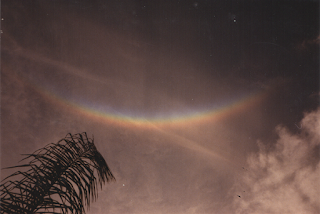[This is my own retelling of a story that I first read as a child]
A long time ago, along the side of a dusty road in India, sat six blind beggars. They would wait patiently until they heard someone approaching and then they would lift up their bowls with their pleas for alms. One day, they heard something different coming along. In addition to hearing the thudding steps of some great beast, they could feel the ground shake slightly beneath them.
"Who goes there?" asked one of the beggars.
"I am Paji," came the answer.
"What is that great beast that we can hear breathing before us?" asked another.
"That is an elephant," replied Paji. "I am its mahout."
"An elephant?" asked the first blind man.
"Yes," he answered. "I am taking it to its new owner."
"We've never heard of an elephant before," said the second beggar. "As you can see, we are all blind. Would you mind if we came forward and ran our hands over this elephant?"
"Yes," added another. "That way we can better understand what this creature is truly like."
"Not at all," smiled Paji. "He's about three steps in front of you."
The six beggars carefully placed their bowls behind them and stood up. Holding out their arms, they slowly approached the elephant.
The first blind man encountered the trunk of the elephant. As it squirmed in his grasp, he thought to himself, "It feels like a snake! An elephant is just like a snake!"
The second blind man found the tusk of the elephant and ran his hands down its smoothness. At the tip, he tested the point and pricked his thumb. "It's just like a spear!" he thought. "An elephant is like a spear!"
The third blind man reached out and grabbed the ear of the elephant. As it waved to-and-fro, he felt the breeze from it and thought, "This elephant is like a giant leaf or fan!"
The fourth beggar touched the side of the elephant. As he ran his hands up and down and left and right he could easily tell that it was like a wall.
The fifth blind man reached the hind leg of the elephant. As he ran his hands up and down the leg and then placed his arms around it, he thought, "This is just like a tree! An elephant is nothing more than a tree!"
The last of the beggars touched the tail and grasped it firmly in his hands. Feeling along its length, he knew that it was simply a rope. "An elephant is like a rope!" he grinned, knowingly.
They thanked the man and carefully retreated, feeling for their bowls. After a bit, they were once more rearranged along the side of the road and began to discuss the marvelous beast that each of them had just felt.
"It was like a snake!" said the first.
"No, it wasn't!" exclaimed the second. "It was like a spear, I tell you!"
The third laughed, "You're both wrong. It was a giant leaf-like fan!"
"The three of you are daft from the sun," disagreed the fourth. "I reached out in every direction and it was the same. No, an elephant is big and flat like a wall."
The fifth shook his head, "You need to stay away from the soma. That elephant was like a tree trunk. I put my arms halfway around it."
"You're all wrong," insisted the sixth. "It was a rope. How could you mistake a rope for a tree or a wall?"
Until their dying days, the six beggars argued over what an elephant looked like. Each of them had "seen" for themselves what it was like. Each of them knew that they were right and that the other five were clearly wrong.
If you want to believe that an elephant is a tree, you'll find people who agree with you and will go into great detail describing the tree. You'll also find a lot of people who keep insisting that it's a snake. Or a wall. But you don't believe them because you already want it to be like a tree. You don't really want to know a fact, you want your opinion to be the fact instead. That is because we are not rational animals, but animals that can rationalize.




